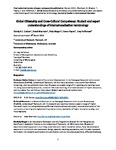Global Citizenship and Cross-Cultural Competency: Student and expert understandings of internationalisation terminology
| dc.contributor.author | Cotton, Debby | |
| dc.contributor.author | Isbelo, Pollyanna | |
| dc.contributor.author | Magne, Pollyanna | |
| dc.contributor.author | Payne, S | |
| dc.contributor.author | Heffernan, TW | |
| dc.date.accessioned | 2018-07-31T09:39:03Z | |
| dc.date.issued | 2018-08-03 | |
| dc.identifier.issn | 1028-3153 | |
| dc.identifier.issn | 1552-7808 | |
| dc.identifier.uri | http://hdl.handle.net/10026.1/11966 | |
| dc.description.abstract |
Internationalization of the curriculum is of increasing interest in many universities; yet, the terminology used to describe it is highly varied and it is not clear that students understand its core concepts. This study explores students’ understandings of the terms global citizenship and cross-cultural competency, and compares them with use in the literature and by experts. A large-scale questionnaire of students from a range of disciplines is supplemented with qualitative data from pedagogic and internationalization experts. Findings indicate that student understandings of both terms were mixed, and frequently differed from the way the terms are used by experts and in the literature. The concept of cross-cultural competency was more likely to invoke a sense of agency among students than was global citizenship, contrary to how they are depicted in the literature. This suggests that there may be some pedagogic benefits to be gained from using the former term. | |
| dc.format.extent | 346-364 | |
| dc.language | en | |
| dc.language.iso | en | |
| dc.publisher | SAGE Publications | |
| dc.subject | internationalization of higher education | |
| dc.subject | internationalization of the curriculum | |
| dc.subject | global citizenship | |
| dc.subject | cross-cultural competency | |
| dc.subject | agency | |
| dc.title | Global Citizenship and Cross-Cultural Competency: Student and expert understandings of internationalisation terminology | |
| dc.type | journal-article | |
| dc.type | Journal Article | |
| plymouth.author-url | https://www.webofscience.com/api/gateway?GWVersion=2&SrcApp=PARTNER_APP&SrcAuth=LinksAMR&KeyUT=WOS:000469858100003&DestLinkType=FullRecord&DestApp=ALL_WOS&UsrCustomerID=11bb513d99f797142bcfeffcc58ea008 | |
| plymouth.issue | 3 | |
| plymouth.volume | 23 | |
| plymouth.publication-status | Published | |
| plymouth.journal | Journal of Studies in International Education | |
| dc.identifier.doi | 10.1177/1028315318789337 | |
| plymouth.organisational-group | /Plymouth | |
| plymouth.organisational-group | /Plymouth/Faculty of Arts, Humanities and Business | |
| plymouth.organisational-group | /Plymouth/Faculty of Health | |
| plymouth.organisational-group | /Plymouth/Faculty of Health/Peninsula Dental School | |
| plymouth.organisational-group | /Plymouth/Research Groups | |
| plymouth.organisational-group | /Plymouth/Research Groups/Institute of Health and Community | |
| plymouth.organisational-group | /Plymouth/Research Groups/Marine Institute | |
| plymouth.organisational-group | /Plymouth/Users by role | |
| plymouth.organisational-group | /Plymouth/Users by role/Academics | |
| dcterms.dateAccepted | 2018-06-27 | |
| dc.rights.embargodate | 2019-2-15 | |
| dc.identifier.eissn | 1552-7808 | |
| dc.rights.embargoperiod | Not known | |
| rioxxterms.versionofrecord | 10.1177/1028315318789337 | |
| rioxxterms.licenseref.uri | http://www.rioxx.net/licenses/all-rights-reserved | |
| rioxxterms.licenseref.startdate | 2018-08-03 | |
| rioxxterms.type | Journal Article/Review |


